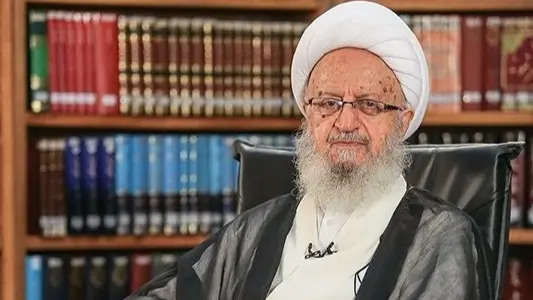
Grand Ayatollah Naser Makarem Shirazi issued a fatwa
1. The Blood Covenant Campaign: Crowdfunding for Assassination?
Bounty on Trump – In early July 2025, a website named Thaar.ir surfaced, claiming to raise funds for the assassination of former U.S. President Donald Trump. The campaign, dubbed “Blood Covenant”, reportedly amassed over USD 40 million in pledges.
- The site featured Trump in crosshairs and quoted Quranic verses to legitimize the campaign.
- It described the effort as a “call to jihad”, urging believers to donate money and sacrifice their lives.
- Analysts at the Foundation for Defense of Democracies (FDD) linked the site to Hossein Abbasifar, a former employee of Iran’s state-run broadcaster IRIB.
While the authenticity of the fundraising total remains unverified, the symbolism and messaging have alarmed global observers.
2. Religious Fatwas and Clerical Endorsements: The Ideological Engine
The campaign gained traction after Grand Ayatollah Naser Makarem Shirazi issued a fatwa declaring Trump and Israeli PM Netanyahu as “enemies of God”.
- The fatwa labeled threats against Iran’s Supreme Leader as “mohareb”, a term that carries the death penalty under Iranian law.
- At least 10 other clerics have endorsed the decree, including Alireza Panahian and Ahmad Alamolhoda, Khamenei’s representative in Razavi Khorasan.
- Some clerics have offered additional bounties, including 100 billion tomans (~$1.14 million) for Trump’s head.
This religious backing has transformed the campaign from fringe rhetoric into a state-aligned ideological movement.
3. Global Reactions: Sanctions, Security, and Diplomatic Shockwaves
The U.S. State Department acknowledged the threat and emphasized its commitment to “maximum pressure” on bad actors.
- The Secret Service confirmed it is operating under heightened threat conditions.
- Analysts have called for targeted sanctions against Abbasifar and other organizers.
- Iranian President Masoud Pezeshkian distanced his administration from the fatwas, but hardline media quickly contradicted him.
The incident has reignited debates over state-sponsored terrorism, cyber threats, and the limits of religious decrees in international law.
4. What’s Next: Escalation or Containment?
| Factor | Implication | Likely Outcome |
| $40M Crowdfunding | Operational funding for assassination | Increased security for Trump |
| Religious Fatwas | Ideological legitimacy for violence | Diplomatic condemnation |
| Iranian Clerical Support | State-aligned incitement | Potential sanctions and isolation |
| U.S. Response | Heightened surveillance and diplomacy | Cyber countermeasures, legal action |
The threat against Trump is not just symbolic, it’s financially backed, ideologically charged, and globally visible. Whether it leads to real-world action or remains a propaganda tool, it marks a dangerous precedent in digital-era extremism.
A New Frontier in Political Targeting
The “Blood Covenant” campaign represents a disturbing fusion of religious extremism, digital fundraising, and geopolitical vendetta. As Iran’s clerics escalate their rhetoric and the U.S. tightens its defenses, the world watches a new kind of conflict unfold, one where ideology meets technology in the most lethal way.
Stay updated with the latest news on Rapido Updates. Keep yourself updated with The World, India News, Entertainment, Market, Automobile, Gadgets, Sports, and many more
Also read: Drone Threat and Divine Decree: Iran’s USD 30M Fatwa Against Trump Sparks Global Alarm
FAQ
What is the “Blood Covenant” campaign launched by Iran?
It’s an alleged crowdfunding initiative, reportedly hosted on a website called Thaar.ir, that aims to raise funds to assassinate former U.S. President Donald Trump. The campaign has purportedly raised over $40 million, backed by religious rhetoric and extremist narratives.
Who endorsed the assassination calls publicly?
Senior Iranian clerics including Grand Ayatollah Naser Makarem Shirazi, Alireza Panahian, and Ahmad Alamolhoda are said to have issued or supported fatwas declaring Trump and Israeli leaders as “enemies of God,” legitimizing violent action in religious terms.
How did the global community respond to this threat?
The U.S. government, including Secret Service and State Department, has acknowledged the campaign and implemented heightened security protocols. International observers have condemned the campaign, viewing it as a serious threat to global stability.
Is this considered an act of state-sponsored terrorism?
While Iran hasn’t officially claimed responsibility, the involvement of clerics linked to the regime’s media and religious institutions raises concerns that this may fall under state-aligned extremism or incitement.
Are there legal implications for Iran or those involved?
Calls for targeted international sanctions and cyber countermeasures have emerged. U.S. lawmakers and global watchdogs may pursue legal action against organizers and promoters if evidence supports direct state involvement.
Could this trigger military or diplomatic escalation?
Potentially. Such public threats can escalate already tense U.S.–Iran relations and jeopardize diplomacy around nuclear talks, prisoner exchanges, and regional security.
How was the campaign promoted online?
The website featured provocative imagery, anti-U.S. slogans, and alleged Quranic justification for the bounty. Analysts say this blends cyber warfare, propaganda, and ideological incitement.
Has Trump or his team responded to the threats?
Donald Trump has not issued a personal public statement, but his security detail is on high alert, and sources suggest his team views the campaign as a serious but politically exploitable threat.